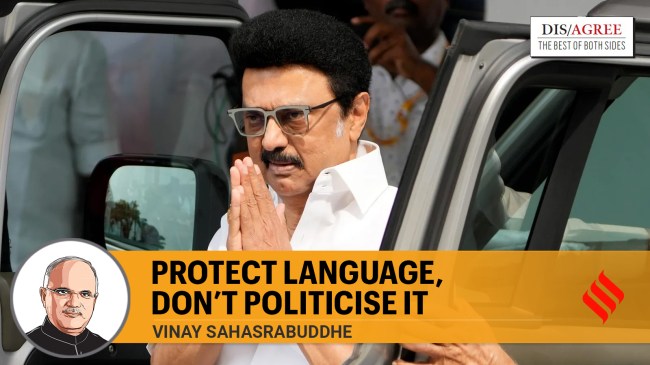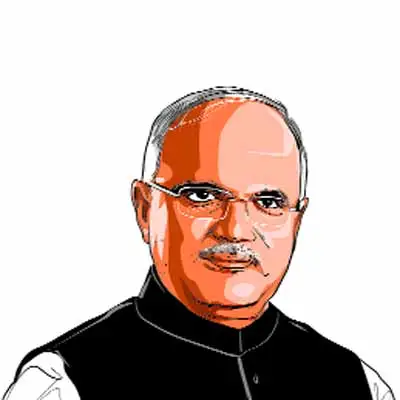Opinion Dis/Agree: CM Stalin, protect language – don’t politicise it
Threat to languages comes not from learning more of them, but rather, colonial impositions and unneeded dilutions
 Tamil Nadu Chief Minister MK Stalin. (PTI)
Tamil Nadu Chief Minister MK Stalin. (PTI) Tamil Nadu Chief Minister M K Stalin’s allegation that Hindi has eaten into smaller languages like Maithili, Santhali, etc, is false and a blatant attempt to pit one language group against the other. It’s vote bank politics in the name of language. Note that no one from these smaller groups — but rather, the Chief Minister of Tamil Nadu — is expressing concern about their languages facing an existential threat. Stalin has a difficult election to face in about a year and an issue as emotive as language is a low-hanging fruit. However, while the argument being made is unconvincing, the manner in which he has taken up the issue is highly irresponsible. Happily, Education Minister Dharmendra Pradhan has made it clear that there is no question of imposing Hindi and the three-language formula only promotes learning an additional language, besides English and the mother tongue.
CM Stalin has also talked about a monolithic Hindi identity. However, no monolithic identity could really be officially established in any language group. In Maharashtra, Karnataka and even Tamil Nadu, people in different regions speak different versions of the language. While no regional government can avoid the standardisation of their respective language, regional variations are bound to be there and there can be no “imposition” in this regard. Resilience and accommodation are fundamental features of Indian culture and straitjacketing is neither practicable nor desirable.
But since Stalin has raked up this issue, it is pertinent to ask why linguistic groups feel threatened. There are at least four key factors behind the existential challenge that languages apparently face. These are linguistic colonialism and its sinister impact, changing ideas of social and cultural status, inertia on the part of language warriors and politics and policies about promoting or preventing the development of any language.
During the Mughal era, Urdu and Farsi made inroads into many Indian languages. The level of adulteration was so alarming that Chhatrapati Shivaji Maharaj had to personally monitor the creation of a Marathi Rajya Vyavahar Kosh, or a dictionary of Marathi administrative terms. With this initiative, he ensured that foreign languages do not have place of pride at the cost of indigenous languages. Later, British rule ensured the needless but all-pervading domination of English and prevented the development of several Indian languages as mediums of acquiring knowledge.
As English was the language of the ruling class, speaking it became a symbol of higher social status leading to an inferiority complex among those speaking their mother tongue. Sadly, save for a few regional languages like Tamil, Bengali, Malayalam and some North Eastern languages, most other Indian language groups have inadvertently submitted to the “status-symbol phenomenon” and paved the way for linguistic adulteration. Many urban dwellers with their mother tongue being Hindi, Punjabi, Marathi or Kannada today are seen using more English terms colloquially. Ignorant of their rich linguistic traditions, many believe that our own languages are poor in vocabulary, and this is the most sinister impact of linguistic colonialism.
While give and take between languages is not entirely preventable and undesirable, the cause of a particular language is well-served only when the processes of coining new words and terms thoughtfully and utilising them keenly are carried out. The natural fusion of languages is not the same thing as needless adulteration. What makes way for linguistic adulteration is the popular mindset where using everything “foreign” is considered synonymous with enhanced social status. Hence, the delinking of languages from social status has to be given top priority if our mother tongues are to flourish.
Languages flourish only when they are used. A few years ago, Kazakh people demanded Hindi movies with Kazakh subtitles and not Russian ones. Similarly, a South Asian leader has expressed the desire to read the Gita Rahasya of Lokmanya Tilak provided it is made available in the language of their country and not in English. In this context, Maharashtra CM Devendra Fadanvis’s move to ask officials to ensure that Marathi is given a place of prominence as a language of statecraft is welcome.
The third life-threatening factor for mother tongues is the inertia of their progeny. Many language warriors have not understood the importance of government efforts to provide medical and engineering education in mother tongues. If our languages have to compete with English and other global counterparts, they have to create meaningful terminologies for new and emerging technologies. Also, language warriors must understand that language is the vehicle of culture. When a language is threatened, the sustenance of the culture of the respective language-group becomes harder.
The antidote for the “politics of language” is a well-laid-down formal policy of language development. For holistic and sustained development of any language, governments and language groups will have to fight together on multiple fronts. From education to entertainment, from literature to libraries and from event management to election campaigns, an emphasis on using mother tongues/regional languages alone will help them not just sustain but also grow.
CM Stalin must understand that raking up anger in the name of language is much easier than actually taking up the cause of any language. He must remember that politicising language matters in a partisan manner in fact hampers the cause of the respective language. Such politicisation is a recipe for converting diversity into divisiveness.
The writer is a National Executive Committee member of the BJP






